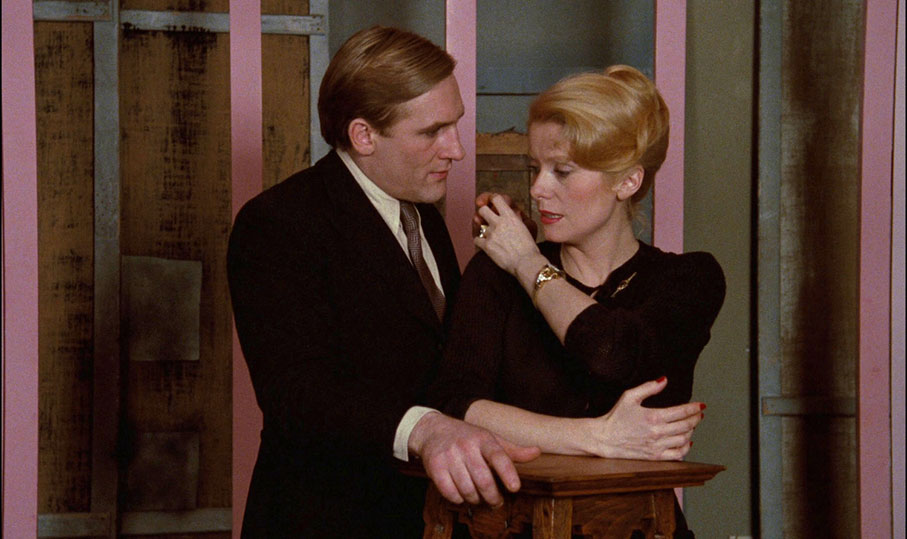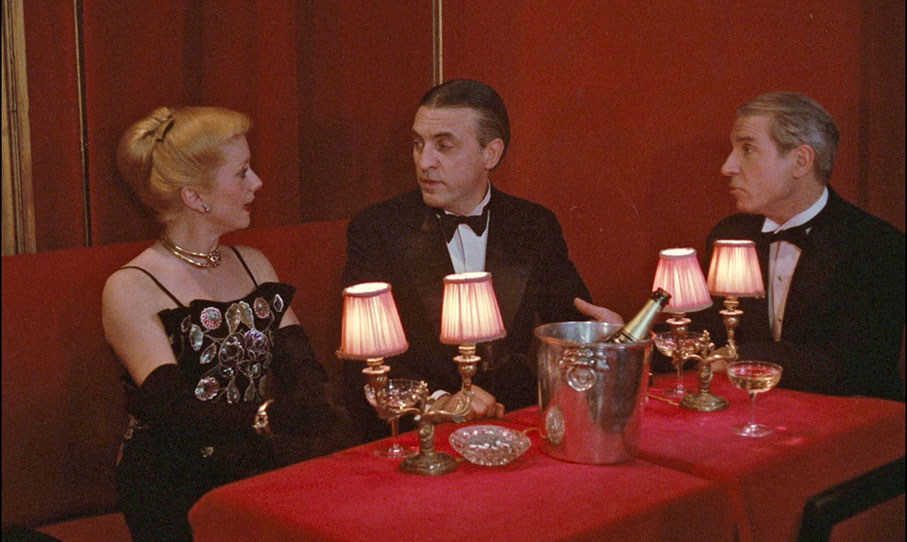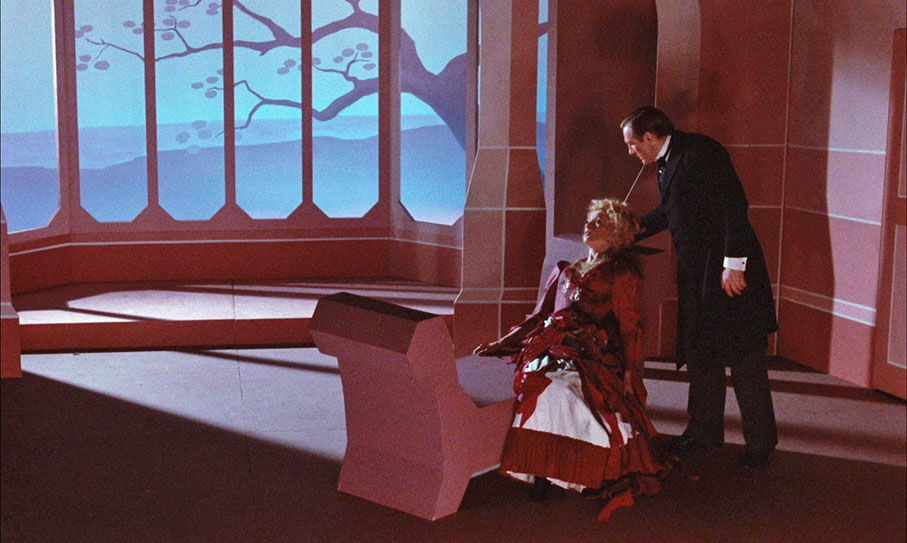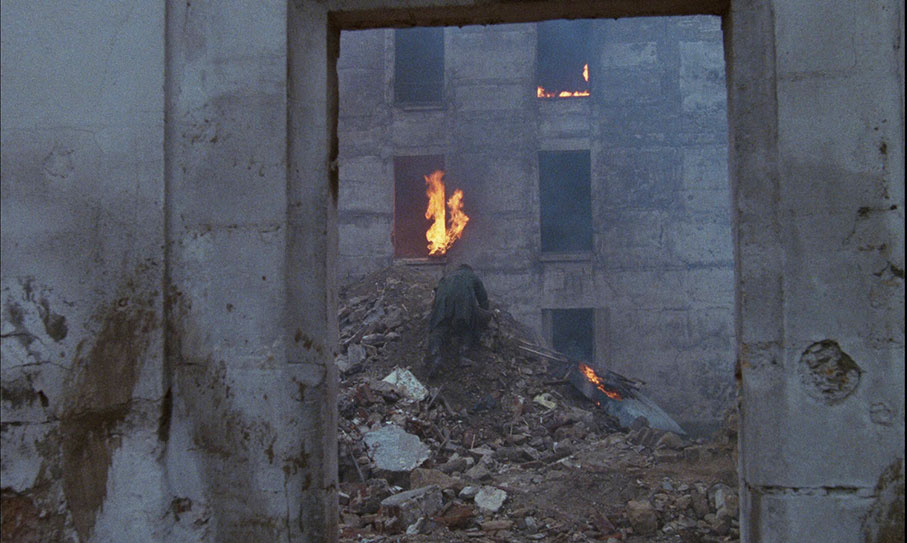|
1942. In occupied Paris, the theatres and cinemas are packed. Due to curfews, they have to finish early as no-one can afford to miss the last metro train home. One theatre is run by Lucas Steiner (Heinz Bennent), but as a Jew he has had to flee the country. His actress wife Marion (Catherine Deneuve) runs the establishment in his stead. Bernard Granger (Gérard Depardieu) is the leading actor. But what only Marion knows is that Lucas is still in Paris, hiding in the theatre's cellar.
What we see of a foreign country's cinema is not what a native sees. François Truffaut's The 400 Blows was one of the films that kickstarted the French New Wave, which became a highly influential movement throughout the 1960s and beyond. However, if the New Wave was where the artistic action was, it was rarely big box office. That was particularly so in the UK and USA where they played generally to the audiences who would go to see films in foreign languages with English subtitled. But if their audiences were a niche, it was an influential one, often including other filmmakers who filtered the New Wave's influence via their own films to a more mainstream audience. However, if you look at a country's biggest successes, they're often dominated by more commercial fare than we might see of that country's output.

Truffaut was less formally experimental than Godard, Resnais or Rivette, and certainly had a warmer sensibility than most of his colleagues, but while he was known and respected both at home and abroad, he had not had a big hit at the box office. However, that changed with The Last Metro, winner of ten César Awards from twelve nominations, and shortlisted for the Best Foreign Film Oscar. (It lost to the Soviet film Moscow Does Not Believe in Tears, released in UK cinemas as Moscow Distrusts Tears, which I haven't seen.) If The Last Metro was a major award-winner, only rivalled by Day for Night in Truffaut's filmography, it was also a considerable commercial success in France, the greatest in Truffaut's career and greater than any film from any other New Wave director.
However, artistic and commercial success do not always go together. Sometimes they do, but often they don't. I doubt that many would now see The Last Metro, written by Truffaut and Suzanne Schiffman (with those two and Jean-Claude Grumberg credited for dialogue) as one of Truffaut's best films. No complaints about the acting, with Catherine Deneuve and Gérard Depardieu on fine form (this was in fact their first film together), and with a very solid supporting cast. This includes Paulette Dubost as Germaine, Marion's dresser, a nod back to Renoir's La règle du jeu in which she acted. Another piece of continuity is Sabine Haudepin as the young actress Nadine Marsac: Haudepin had played notable child roles in both Jules et Jim and La peau douce. There's a definite "family" feel to The Last Metro, with Truffaut continuing to work with people he had worked with many times before, including score composer Georges Delerue and cinematographer Nestor Almendros. The former first worked with Truffaut on Jules et Jim, the latter with The Wild Child (L'enfant sauvage, 1970). Truffaut had asked Almendros to work with him because the film was to be made in black and white and he had liked Almendros's monochrome work on Eric Rohmer's My Night at Maud's (Ma nuit chez Maud, 1969). Almendros went on to shoot eight more films for Truffaut in total.
This was Depardieu's first film with Truffaut, and he would go on to star in the two films the director went on to make before his early death in 1984, from a brain tumour, aged fifty-two. Production design and period detail is excellent, and Nestor Almendros's camerawork certainly deserved the César it won. The film certainly looks wonderful and there's certainly a lot of interest. (Including that rare thing in a Truffaut film, two characters revealed to be gay, in one brief scene – in fact, I can't think of other examples offhand. The fact that Marion, and presumably Truffaut, deal with the matter so matter-of-factly, has convincingly been taken as a mark of Truffaut's humanism. And as Annette Insdorf points out in her commentary, it wasn't just Jews who had to be in hiding under German occupation – homosexuals had to as well, even if they could still appear in public.)

Yet somehow, try as I might, after several viewings now with another rewatch for this, The Last Metro, while certainly remaining watchable, is somewhat bland and a little uninvolving. While I'm aware that Truffaut (born 1932) lived through the Parisian occupation, and I can't doubt his sincerity in making this film, but it seems too soft-edged for what must have been a fraught and terrifying time. Nestor Almendros's cinematography, fine though it is, only adds to this impression.
If I'm being hard on this film, it's because to me it falls short of Truffaut's highest standards. Truffaut was a devoted admirer of Hitchcock, and perhaps some of that director's darker sensibility was what I was missing. The film will of course still be essential viewing for Truffaut's fans, of which there are many. In some ways it's Truffaut's swansong, bringing together many of his themes, even if there were two more relatively minor films to come. I just wish I liked it more than I do.
The Last Metro is one of four Truffaut films released on Blu-ray by the BFI, preceded by The 400 Blows and Jules et Jim, simultaneously with La peau douce. The film was given an A certificate by the BBFC in 1981 and has that certificate's equivalent, PG, on disc.
Most of Truffaut's feature films, and all nine of them photographed by Almendros, are in the ratio of 1.66:1, which just for once we have a primary source for (Almendros's book A Man with a Camera), and this Blu-ray transfer is in that ratio. It is derived from a 2K restoration from the original camera negative. Almendros's work is dominated by browns, reds and ochres, evoking the look of European Agfacolor films of the period, and also recreating the yellowish look of contemporary lighting and that's well rendered in this transfer, with grain natural and filmlike. Almendros was one of the great cinematographers of his day, the great classicist, prioritising natural light or a recreation of it, and it's good that we have his work available in HD.
The soundtrack is the original mono, and is clear and well balanced. English subtitles are optional, available for the feature and also for the French-language commentary.
Commentary by Gérard Depardieu and Jean-Pierre Azéma
This commentary, recorded in 2000, has appeared on previous Blu-ray and DVD releases of The Last Metro. It is moderated by critic Serge Toubiana. Depardieu talks about his work with Truffaut on this film and beyond, and how he overcame his intial prejudices to become a dedicated collaborator. He also speaks movingly about Truffaut's final illness and death. Azéma is a historian and an authority on the period and his contributions concentrate on that, even pointing out a few mistakes in period detail.

Commentary by Annette Insdorf
This commentary is newly recorded. Insdorf is an academic who had worked with Truffaut as an interviewer and as his translator, and the author of a book on him. She gives a detailed discussion on the film and its place in Truffaut's personal life as well as its career, clearly rating it more highly than I do.
Deleted scene: Angels of Mercy (5:00)
In which Valentin (René Dupré) visits Marion to discuss his script. This was removed from the theatrical release but reinstated on VHS. It clearly survives in good enough nick to be presented on this Blu-ray in full HD.
Trailer (2:44)
Given that the film this is promoting is from near the end of Truffaut's career (though no one knew that at the time) rather than from near its beginning, you can sense a different pitch to the trailers we've seen on the BFI's other Truffaut Blu-rays. So no critical quote overload: it assumes we know who Truffaut was and here is his latest film and here are the big names starring in it. It clearly worked, given the film's success at the French box office.
Stills gallery (1:44)
A self-navigating gallery of production stills, in both black and white and colour.
Booklet
The BFI's booklet, available with the first pressing only, runs to twenty-eight pages. Given that we don't have anything on this disc as we did on the other three releases from the BFI's Truffaut study day, the participants still get to contribute to this one. Annette Insdorf provides the one new commentary on the four discs and Pasquale Iannone kicks off the booklet with the overview essay on The Last Metro. He begins by pointing out that most of the prominent New Wave directors were teenagers during the War years (Rohmer, born in 1920, being the exception) but they all took a long time before dealing with World War II in their own films. In Truffaut's case that was over twenty years into his directing career and in fact near to the end of it. Other than Chabrol, who returned to the subject more than once, the others did not deal with a subject which would have been a major part of their formative years. Iannone does address the film's theatricality and does argue for it being more than a middle-of-the-road nostalgia piece.

Truffaut's critical reputation is the subject of a piece by another third contributor to that study day, Catherine Wheatley, who begins by suggesting that the British may have cooled to Truffaut because of his infamous assertion to Hitchcock that there might be a certain incompatibility between the words "British" and "cinema". While Godard, Varda, Rohmer, Resnais and Chabrol's reputations are secure for the time being, Truffaut's has lapsed somewhat. But Truffaut was the one who made relationships with the critical young Turks of British cinema (Lindsay Anderson, David Robinson, Gavin Lambert). The 400 Blows and Jules et Jim ran for months at the Curzon cinema in London, which was for many years Truffaut's prime London venue. However, later films were much less well received, to the point where his 1969 film Mississippi Mermaid only played (other than festival showings) in a cut and dubbed version, five years later. For a time Truffaut was accused of producing the kind of bland "cinema of quality" fare that he had railed against as a critic. Wheatley compares him to Louis Malle, another French director of the time (not strictly speaking a New Waver), adept at various genres, now somewhat neglected in Britain. Maybe, she says, there is a certain incompatibility between the words "Britain" and "Truffaut".
The booklet also contains film credits, reprints of the 1981 Monthly Film Bulletin and Sight & Sound reviews (by Richard Combs and Julian Jebb respectively) and notes on the extras.
The Last Metro was Truffaut's antepenultimate feature film, and his biggest commercial hit. While I don't regard it as one of his best, there's no doubt of its significance in his career, and it's well presented in this BFI Blu-ray.
|